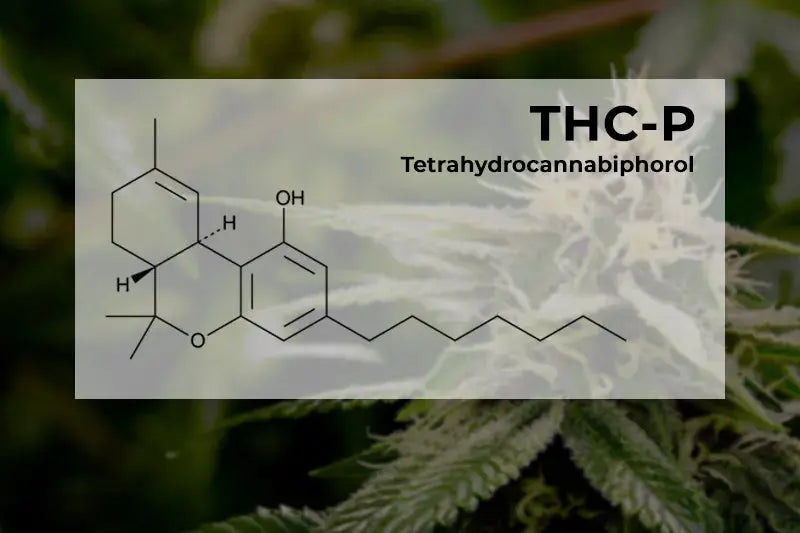What is THCP?
THCP, also called tetrahydrocannabiphorol, is a newly discovered cannabinoid found in the cannabis plant. It is chemically similar to THC (tetrahydrocannabinol), the most well-known psychoactive component of cannabis, but has a stronger binding affinity to the cannabinoid receptors in the body. This means that THCP could potentially cause stronger and longer effects than THC.
Research on THCP is still in its early stages, and there are many unanswered questions about the potential medical uses and safety of this cannabinoid. Some studies suggest that THCP may have anti-inflammatory, analgesic and neuroprotective properties, but further research is needed to confirm these results and determine the correct dosage and possible side effects.
How is THCP different from THC?
THCP (tetrahydrocannabiphorol) is a recently discovered cannabinoid that is similar in some ways to THC (tetrahydrocannabinol), but also has differences
1. Structure: THCP has an extended alkyl chain compared to THC, potentially making it more potent.
2. Effect: In studies, THCP is around 30 times stronger than THC. However, further research is necessary to better understand the exact effects.
3. Availability: THCP is present in cannabis plants in lower amounts than THC.
4. Legal situation: Since THCP is a newly discovered product, legal regulation is still unclear and may vary from country to country.
THCP is an emerging cannabinoid that may have greater potential than THC. Further research is needed to better understand its effects and uses. It remains to be seen how the legal situation develops.
How does THCP affect the body?
THCP, also known as tetrahydrocannabiphorol, is a newly discovered cannabinoid found in the cannabis plant. It has a similar structure to THC, the most well-known psychoactive component of cannabis, but THCP is thought to have a stronger effect on the body.
The effects of THCP occur by binding to the CB1 and Binds to CB2 receptors in the endocannabinoid system (ECS). The ECS is an important part of the human body involved in regulating sleep, pain, mood and other functions.
Some studies have shown that THCP has up to 30 times greater affinity for the CB1 receptors than THC, suggesting it may have a more intense effect. Possible effects of THCP can include pain relief, relaxation, appetite stimulation and mood improvement.
Are there studies on THCP?
THCP, also known as tetrahydrocannabiphorol, is a relatively new cannabinoid that was only recently discovered. Since it is a recent discovery, studies on THCP are still limited. However, research to date shows that THCP may be more potent than THC, the best-known psychoactive cannabinoid in cannabis.
Some researchers are currently investigating the potential medical uses of THCP, such as pain management, anti-inflammatory and neuroprotective properties. However, more extensive studies are needed to understand the exact effects and uses of THCP.
It is important to note that THCP has not yet been sufficiently researched and current findings are preliminary. Future studies will hopefully provide more clarity on the effects, benefits and safety of THCP. Until then, it is advisable to be cautious and wait for further research results.
Is THCP legal?
THCP, also known as tetrahydrocannabiphorol, is a newly discovered cannabinoid that has similar properties to THC.
The legality of THCP varies depending on the country and its legislation. In some countries, such as Germany, all cannabinoids that have psychoactive effects are illegal. Since THCP is similar to THC, it could also fall into this category.
In other countries where medical cannabis is legal, THCP could potentially be approved as an ingredient in medical cannabis. However, research on THCP is still in its early stages and there are no clear regulations yet.
To stay up to date on the legality of THCP, it is important to check your country's laws and for current developments to be respected.
Conclusion: The legality of THCP depends on the legislation of the respective country. Therefore, it is advisable to inform yourself about local laws and pay attention to updates.
How is THCP produced?
THCP, also known as tetrahydrocannabiphorol, is a new emerging cannabinoid derived from the cannabis plant. The production of THCP takes place in several steps:
1. Raw material extraction: First, the cannabis plant is harvested and dried to obtain the flowers and leaves, which are rich in cannabinoids.
2. Extraction: The next step is to extract the cannabinoids, including THCP, from the plant using a special extraction method. Common methods are CO2 extraction, ethanol extraction or butane extraction.
3. Cleaning: After extraction, the raw extract is cleaned to remove unwanted plant components such as waxes and fats. This process is called winterization.
4. Distillation: Once the raw extract is purified, it is distilled to separate the different cannabinoids. THCP is isolated from other cannabinoids such as THC and CBD.
5. Purity Testing: Finally, the isolated THCP is tested for its purity and quality before being used for medical or recreational purposes.
Can you consume THCP?
Yes, THCP (tetrahydrocannabiphorol) can be consumed. It is a cannabinoid that occurs in the cannabis plant and can have similar effects to THC (tetrahydrocannabinol). However, THCP remains poorly understood and it is unclear how it affects the human body.
Some studies suggest that THCP may be more potent than THC, which could lead to more intense psychoactive effects. However, it is important to note that, as with other cannabinoids, consuming THCP can also pose potential risks and side effects.
It is advisable to do your research before consuming THCP and do so responsibly deal with it. Since THCP has not yet been extensively researched, caution is advised, especially for people with previous illnesses or who are taking medication at the same time.


Share:
The effects of CBD flowers - what you should know
Is H4CBD legal?